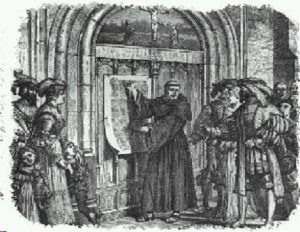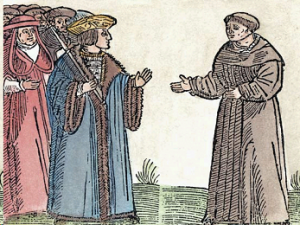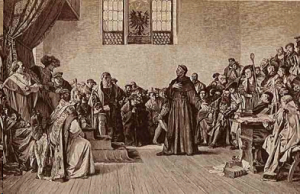It’s Here! The 500th Anniversary of
the Start of the Reformation.
What’s the Big Deal.
“For I am not ashamed of the gospel, for it is the power of God for salvation to everyone who believes, to the Jew first and also to the Greek. For in it the righteousness of God is revealed from faith to faith; as it is written, ‘But the righteous man shall live by faith.’” (Romans 1:16-17)

It was last October, a year ago, that we began working on our celebration of the 500th anniversary of the nailing of the 95 Theses by Martin Luther to Wittenberg’s chapel door. The nailing of the 95 Theses to the chapel door set in motion a series of events and subsequent confessions of the Gospel that changed the church and the world.
But the truth is, by the time Martin Luder (his given name) was born on November 10th 1483, change was already “in the air.” The seeds of capitalism were beginning to sprout and the feudalistic system that had proven so oppressive to the vast majority of people in Europe was beginning to crack.
The educational system was also experiencing a shift. For a thousand years, the Roman Church had maintained an educational system that had but one goal, namely to advance the goals (good and bad) of the church. All was done in service of the church and very often at the expense of the native peoples.
The philosophy of humanism (not to be confused with the modern philosophy of humanism, which is openly hostile to the Christian Faith) was reshaping how and what was being taught in the schools and universities. Under this new philosophy the Renaissance began to change Europe.
Education was to serve the best interests of the individual and the advancement of the people, rather than the institutions and narrow agenda of the Roman Church. This new way thinking manifested itself in the arts, architecture, politics, science, and literature.
Humanism found beauty in nature and art began to reflect it. The Renaissance gave birth to scientific discovery (e.g., Copernicus), and emphasized man’s potential for good and improvement. There was also a return to original sources and languages as the objects of study (rather than simply believing what some middleman–i.e., the Roman or Eastern Church said “they said”). Thus, Luther’s desire to return to the original Greek and Hebrew texts of the Bible. When he did he found mistakes in the Vulgate (the approved Latin translation of the Roman Church). Correcting some of those mistakes led to the discovery of the meaning of repentance and the Christian life as a life of repentance.
Europe was also beginning to discover new places and new peoples and new trading partners (the Americas and the far east). Nationalism was on the rise. Princes, nobles, and peasants were beginning to put their countries and territories first. They had grown weary of the constant demand for their money to be exported to Rome.

Then there was the invention of the Gutenberg printing press. Second, only to Luther, the printing press made it possible for the writings of Luther and the Word of God itself to be reproduced and spread throughout Europe.
Let’s be honest about the Reformation. After centuries of history being “stuck in place,” by the time Martin Luther was born, history was already and finally moving forward. With or without Luther, western civilization was on the edge of something new and different.
But listen to what the Lord God gave the prophet Daniel (2:21) to write. “It is He who changes the times and the epochs; He removes kings and establishes kings; He gives wisdom to wise men And knowledge to men of understanding.”
God the Father, Son, and Holy Spirit is the architect of history and as important, brilliant, brave, interesting, and articulate as Luther was, the Reformation is more about the “what” than the “who.” Luther himself said of the Reformation,
“I simply taught, preached, and wrote God’s Word; otherwise I did nothing. And then, while I slept, or drank Wittenberg beer with my Philip [Melanchthon] and my Amsdorf [Nicholaus Von], the Word so greatly weakened the papacy that never a prince or emperor did such damage to it. I did nothing. The Word did it all.”
We know the “who” of the Reformation (Luther and the Reformers who followed). But what is the “what” of the Reformation?
PBS has produced and aired a docudrama, titled, “Matin Luther, The Idea That Change The World.” While this docudrama is among the best I have seen on Luther and the Reformation, it presents the rediscovery of the Bible’s teaching that the sinner is saved by grace through faith as “an idea.” Others are celebrating Luther as a man who pioneered the belief that a person should be free to follow his or her own conscience. Still others are celebrating the Luther who shaped the language and culture of the German speaking people. And still others see him as the primary catalyst for the cultural and political shift of the West.
F.A.E. Pasche, in his devotional book titled, Daily Bread, published by Concordia Publishing House in 1929 wrote, “Who can enumerate the blessings which came upon the whole world in the consequence of the Reformation? [The Reformation] advanced ideas of human rights, our free institutions, our political and religious liberty, education, – – these, in addition to the pure Gospel, which is the greatest blessing, are all fruits of the Reformation.”
The Reformation did help open the door to many cultural, religious, and political freedoms for which the people of the West ought to be forever grateful. At the end of the PBS docudrama mentioned above, the narrator summarizes many of the temporal benefits of the Reformation. In this sense, we are all heirs of the Reformation. Unfortunately, over the past 100 years or so the people of the people of Europe and America, have used these freedoms for ill and have disregarded the wholesome fruits of faith.
While the Reformation produced many fine temporal benefits, the chief and central benefit of the Reformation is the preaching and teaching of the authentic Gospel of Jesus Christ and the freedom and joy the Christian has in the Gospel: A person is saved, made righteous before God by grace through faith, apart from works, for Christ’s sake alone. God does and gives everything needed for salvation through the Word and Sacrament Ministry of His Church.
As Luther stood before Charles V at the Diet of Worms he made his perilous and famous confession of faith.
Unless I can be instructed and convinced with evidence from the Holy Scripture or with open, clear, and distinct grounds and reasoning-[for] my conscience is captive to the Word of God-then I cannot and will not because it is neither safe nor wise to act against conscience. Here I stand. I can do no other. God help me! Amen.
When Luther made this confession it signaled a shift on the question of religious authority from the Pope and church councils to Holy Scripture as the sole source and norm of Christian doctrine and life. Councils, creeds, and church fathers remained important, but only insofar as they agreed with the Scripture and the Gospel.
Jesus Christ was reasserted as Savior of the world, not the new Law-Giver. Christ is the “Bringer” of salvation, not the Helper toward salvation. Jesus’s perfect life and death on the cross was presented by Luther and the Reformers as all sufficient. His work is sufficient to forgive all sin and guilt (original and actual sin). No other helpers are needed: whether Mary, or saint, or relic, or indulgence, or act of penance, and no more purgatory wherein the scale of justice is balanced.
The Biblical teaching of grace was reasserted. Outside the Roman Church grace was no longer taught as an infused quality or habitus (alla Aquinas/Aristotle) that enabled a person to work out ones salvation within the Roman sacramental system. Grace was accurately presented as the undeserved favor of God. To say that we are saved by grace means that God offers salvation, justification, forgiveness, heaven, as a gift, paid for by the suffering and death of Jesus Christ. This left no room for man’s works and achievements. Grace alone.
The Church of the Middle Ages had taught that faith saves only if it is made complete by good works. Luther reasserted the Biblical teaching of faith, that faith saves apart from works. Faith is that which receives the gift of forgiveness in Jesus Christ. It is the hand that takes the gift. Faith itself is a gift and it is the confidence that says, “Yes, I believe that Jesus Christ suffered and died for me and I am completely forgiven.” Faith alone saves.
The Reformation moved people from uncertainty and insecurity to certainty and security in Christ. The Christian was no longer left to hang between hope and fear. In the Gospel there is only hope and joy. The Christian was now certain that he would enter heaven when he died.

The restoration of the Gospel moved people from a life devoted to saving oneself by works to a life dedicated to loving, serving, and saving. Once it became clear that Christ had already done everything necessary to save them, Christians were set free to do works to benefit others. “A Christian man is the most free lord of all, and subject to none; a Christian man is the most dutiful servant of all, and subject to every one.” (On the Freedom of The Christian, Luther, 1520)
The sacraments had been taught to be a work of man/the church wherein God’s favor was earned. Through Luther and those that follow, God restored the Bible’s teaching that the sacraments are the work of God, the means wherein He forgives sins by distributing the work of Christ to believers.
The Lutheran Reformation also reintroduced the distinction between the Law and Gospel as the most important key in interpreting the Bible. Over the centuries the Law and Gospel were confused and misused. In the Heidelberg Disputation Luther said, “#26 “The Law says, ‘Do this!’ and it is never done. Grace says: ‘Believe in this! and forthwith everything is done.’”
This month we celebrate 500 years of the continuous preaching of the Gospel and right administration of the sacraments in faithful congregations and by faithful pastors who hold to the teachings of Holy Scripture. All that we do as a congregation (church services, our homepage and Facebook page, the various events we host throughout the year, the Luther play, etc) are being done in service of the Gospel and in the hope and with the prayer that the kingdom of God comes to us and to our neighbors by the preaching and speaking of His Word to one and all in whatever venues we are granted and whenever the opportunities present themselves. For the kingdom of God comes “when our heavenly Father gives us His Holy Spirit, so that by His grace we believe His holy Word and lead a godly life here in time and yonder in eternity.”
Pastor Craig Stanford
